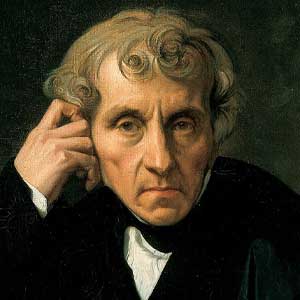Luigi Cherubini Biography - A Very Quick Guide
Artist:
Luigi Cherubini
Born:
14 September 1760
Died:
15 March 1842
Luigi Cherubini was an Italian-born composer who became one of the most important figures in French musical life during the late 18th and early 19th centuries. He is especially remembered for his operas and sacred music, and for his influential role as director of the Paris Conservatoire.
Cherubini was born on September 14, 1760, in Florence, Italy, into a musical family - his father was a harpsichordist and his first teacher. A prodigy, Cherubini began composing sacred music at the age of 13 and went on to study counterpoint and composition with Giuseppe Sarti in Bologna and Milan. His early works followed Italian opera traditions, but exposure to Viennese and French styles soon broadened his horizons.
In 1786, Cherubini settled in Paris, where he would live for the rest of his life. He became associated with the new French operatic tradition, and his works were admired by contemporaries such as Beethoven, who considered Cherubini one of the greatest living composers.
Among his most notable operas are:
Lodoïska (1791), which established his reputation in Paris with its revolutionary spirit and dramatic urgency.
Médée (1797), his masterpiece, combining Italian lyricism with French dramatic power (though originally unsuccessful, it later gained recognition, especially in the 20th century through revivals by Maria Callas).
Les deux journées (1800), admired for its tight structure and expressive depth.
After the turn of the century, Cherubini composed fewer operas and turned increasingly to sacred music. His Requiem in C minor (1816), written for the anniversary of the execution of Louis XVI, is considered one of his finest achievements and was admired by later composers, including Schumann and Brahms.
Cherubini also became a central figure in French musical education. Appointed Director of the Paris Conservatoire in 1822, he held the position until his death. He was known as a strict and sometimes irritable administrator, but his influence on generations of musicians was immense.
He was recognized in his lifetime as a grand figure of European music, decorated by both Napoleon and later by the restored French monarchy. Beethoven kept Cherubini’s portrait on his desk, and Wagner—though critical—acknowledged his significance.
Cherubini died in Paris on March 15, 1842, and was buried at Père Lachaise Cemetery, near Chopin’s grave.
Cherubini was born on September 14, 1760, in Florence, Italy, into a musical family - his father was a harpsichordist and his first teacher. A prodigy, Cherubini began composing sacred music at the age of 13 and went on to study counterpoint and composition with Giuseppe Sarti in Bologna and Milan. His early works followed Italian opera traditions, but exposure to Viennese and French styles soon broadened his horizons.
In 1786, Cherubini settled in Paris, where he would live for the rest of his life. He became associated with the new French operatic tradition, and his works were admired by contemporaries such as Beethoven, who considered Cherubini one of the greatest living composers.
Among his most notable operas are:
Lodoïska (1791), which established his reputation in Paris with its revolutionary spirit and dramatic urgency.
Médée (1797), his masterpiece, combining Italian lyricism with French dramatic power (though originally unsuccessful, it later gained recognition, especially in the 20th century through revivals by Maria Callas).
Les deux journées (1800), admired for its tight structure and expressive depth.
After the turn of the century, Cherubini composed fewer operas and turned increasingly to sacred music. His Requiem in C minor (1816), written for the anniversary of the execution of Louis XVI, is considered one of his finest achievements and was admired by later composers, including Schumann and Brahms.
Cherubini also became a central figure in French musical education. Appointed Director of the Paris Conservatoire in 1822, he held the position until his death. He was known as a strict and sometimes irritable administrator, but his influence on generations of musicians was immense.
He was recognized in his lifetime as a grand figure of European music, decorated by both Napoleon and later by the restored French monarchy. Beethoven kept Cherubini’s portrait on his desk, and Wagner—though critical—acknowledged his significance.
Cherubini died in Paris on March 15, 1842, and was buried at Père Lachaise Cemetery, near Chopin’s grave.
Top Pieces on 8notes by Luigi Cherubini
